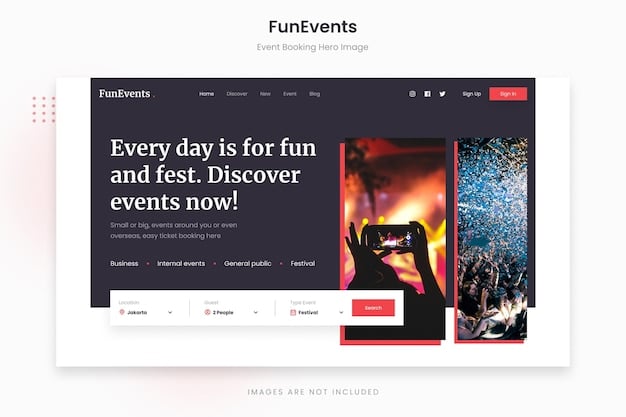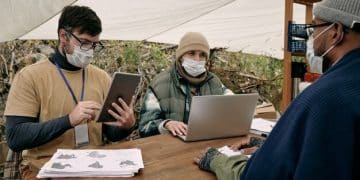Building a Community Website: Connect Your Neighborhood Online

Building a Community Website: Connecting Residents and Sharing Information allows neighborhoods to enhance communication, share vital resources, and foster a stronger sense of unity and belonging among its members.
Imagine a digital hub where your neighbors connect, share information, and strengthen the bonds of community. Building a Community Website: Connecting Residents and Sharing Information is now easier than ever, fostering a space where everyone feels welcome and informed.
Why Build a Community Website?
Creating a community website extends beyond mere digital presence; it establishes a central source for information, collaboration, and local engagement. It becomes the virtual heart of your neighborhood, fostering connections that might not otherwise occur.
Consider the impact on neighborhood watch programs, local events, and resource sharing. A dedicated website can streamline communications and boost community participation.
Centralized Information Hub
A community website provides a one-stop-shop for essential information. This includes local news, upcoming events, emergency alerts, and contact details for community leaders.
- Increased Accessibility: Residents can access vital information at any time, from any location.
- Reduced Information Overload: Prevents important updates from getting lost in email chains or social media feeds.
- Easy Navigation: A well-organized website allows residents to find information quickly and efficiently.

Improved Communication Among Residents
Beyond information dissemination, a community website can significantly improve communication. Forums, message boards, and contact forms facilitate dialogue and collaboration.
Enabling direct feedback mechanisms on the community website allows leaders to stay informed and respond effectively to resident concerns.
Essential Features for Your Community Website
Choosing the right features will ensure your community website serves its purpose effectively. This section explores the essential components crucial for effective communication and engagement.
Incorporating these features thoughtfully ensures your community website remains a valuable resource for residents.
Calendar of Events
A shared calendar is a simple yet powerful feature for announcing and organizing community events. This keeps residents informed about local happenings.
Interactive calendars allow residents to RSVP to events, set reminders, and even suggest new events to add to the calendar.
Local Business Directory
Support your local businesses by featuring them on a dedicated business directory within the website. This highlights local entrepreneurs to the community.
Forums and Discussion Boards
Interactive forums and discussion boards encourage communication among neighbors. Encourage dialogue and the sharing of ideas through these interactive spaces.
- Facilitates Discussions: Allows residents to discuss neighborhood issues, share opinions, and offer support.
- Creates a Sense of Belonging: Fosters a sense of community by encouraging online interaction.
- Provides a Platform for Feedback: Residents can provide feedback on community initiatives and voice their concerns.
Choosing the Right Platform for Your Website
Selecting the right platform is vital to the smooth running of your community website. This section outlines the most popular options, and their benefits.
The best platform will depend on your technical skills, budget, and vision for the website.
WordPress
WordPress offers flexibility and customizability, making it an attractive option for many community websites. The platform is easy to use and highly scalable.
Website Builders (Wix, Squarespace)
For beginners, user-friendly website builders can offer a simpler route to setting up a community website. Squarespace and Wix are two common options.
Many website builders offer drag-and-drop interfaces and templates that are simple to use.

Custom Development
For websites with very specific needs, engaging a developer to create a custom website might be the best option. Fully customized websites can cater to niche requirements.
Custom development provides maximum control but also requires more time and financial resources.
Promoting Your Community Website
Once your website is built, it’s vital to promote it to community residents to ensure effective usage. This section includes strategies promoting community websites.
Without effective promotion, residents may not know the website exists or understand its value.
Local Flyers and Posters
Traditional methods like flyers and posters in key local spots effectively announce the website launch to those who may not be digitally engaged.
Physical promotions can be incredibly valuable alongside digital marketing.
Social Media
Leveraging social media platforms is an indispensable way to reach a broad segment of your community. Sharing updates and highlighting important information keeps the community informed.
- Targeted Reach: Social media allows you to target specific demographics within your community.
- Real-Time Updates: Share urgent news, event reminders, and community announcements instantly.
- Engagement Opportunities: Encourage residents to share content, participate in discussions, and connect with each other.
Email Newsletter
An email newsletter serves as a direct line of communication with your community. It’s ideal for delivering updates and reminders.
Make sure to obtain clear consent from residents before adding them to your email list, respecting their privacy preferences.
Maintaining and Growing Your Community Website
Maintaining a website requires regular effort to keep it relevant and up-to-date. Here are some steps to take in maintaining a growing community website.
Consider how the website can adapt to meet community needs over time.
Regular Content Updates
Consistently updating the website with fresh information keeps it engaging and relevant. Aim for a regular posting schedule.
Adding new content ensures that the website remains a valuable resource for the community.
Gathering and Acting on Feedback
Encourage residents to provide feedback on the website and act on their suggestions. This shows residents that their opinions are values.
Consider including a feedback form on the website or conducting regular surveys.
Security Considerations
Ensuring the website is secure from cyber threats is vital in maintaining community trust. This entails regular security audits and updates.
Take steps to secure the website and protect resident data.
| Key Point | Brief Description |
|---|---|
| 📢 Communication | Enhances communication among residents. |
| 📅 Calendar | Keeps residents up-to-date with local events. |
| 💼 Business Directory | Supports local businesses and entrepreneurs. |
| 🛡️ Security | Ensures website safety with regular security audits. |
Frequently Asked Questions
▼
A community website enhances communication, shares vital information, and fosters a stronger sense of belonging among residents. It also facilitates greater participation in local events.
▼
WordPress is a popular choice due to its flexibility and customizability. Website builders like Wix and Squarespace are good for beginners seeking a simpler setup, but fully bespoke sites are also an option.
▼
Use a combination of methods, including flyers, social media, and email newsletters. Social media is especially invaluable for reaching broad segments of a community and sharing pertinent updates.
▼
Keeping your community content fresh is pivotal for sustaining community engagement. A regular publishing schedule is highly recommended, even if it is just one or two pieces of content a week.
▼
Routine security audits and consistent updates are essential for guarding your website against potential cyber threats. Protecting resident data is a priority and builds crucial engagement and trust.
Conclusion
Building a Community Website: Connecting Residents and Sharing Information may at first seem daunting, but by creating one, it offers a vital service by enhancing communication, fostering a sense of belonging, and providing a centralized resource of information for your community.





